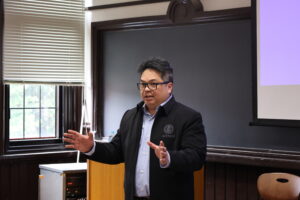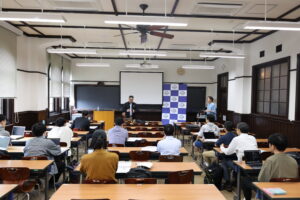On September 30, 2024, the Institute for Global Governance Research (GGR) at Hitotsubashi University hosted the 31st GGR Brown Bag Lunch Seminar titled “The Peril of Hyper-Presidentialism in the Philippines,” featuring Mr. Michael Henry Yusingco, LL.M., a Senior Research Fellow at the Ateneo Policy Center within the School of Government at Ateneo de Manila University.
Mr. Yusingco began by outlining that one of the most profound impacts of the hyper-presidential system is the impression that the president serves as the sole representative of the entire populace, accompanied by significant risks. He elaborated that the president’s authority is strengthened to issue decrees, declare a state of emergency, appoint senior officials, reallocate funds, and reorganize administrative bodies. This could lead to an imbalance in the government structure. In this scenario, he suggested, the legislative and judicial branches could be relegated to subordinate roles, thereby potentially undermining the legitimacy of democracy.
Furthermore, Mr. Yusingco examined the hyper-presidential system in the Philippines, referencing Philippine legal statutes to argue that presidential powers in the Philippines are not confined to those specifically enumerated in the Constitution. He contended that the scope of executive power is not limited to the enumerated powers.
In conclusion, Mr. Yusingco emphasized that the hyper-presidential system fosters a mindset wherein the president may view themselves akin to a monarch or autocrat. From the perspective of the president, constitutional norms and institutions may be disregarded even within a democratic framework. This is justified by a mechanism where ‘the people’ have ostensibly conferred such authority upon the president. This outlook gives rise to concerns about the possibility of arbitrary decision-making without appropriate consultation or consideration of the potential consequences.
During the Q&A session, participants inquired why the Philippine Constitution had chosen a presidential system, potentially conducive to dictatorship, over a parliamentary system with a prime minister. Mr. Yusingco remarked that this decision is deeply intertwined with the history of American colonization.
【Event report prepared by】
YAN Feng (Master’s student, Graduate School of Law, Hitotsubashi University)
KISHI Akihito (Undergraduate student, Faculty of Law, Hitotsubashi University)


